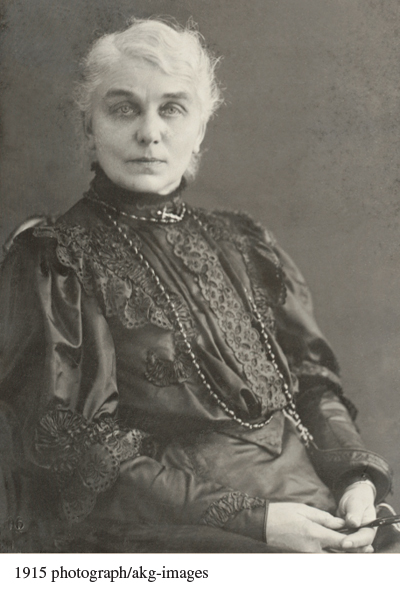A History of Western Society: Printed Page 744
A History of Western Society, Concise Edition: Printed Page 742
Individuals in Society
Franziska Tiburtius

W hy did a small number of women in the late nineteenth century brave great odds and embark on professional careers? And how did a few of them manage to reach their objectives? The career and personal reflections of Franziska Tiburtius (tigh-
Like many women of her time who studied and pursued professional careers, Franziska Tiburtius (1843–1927) was born into a property-
Supported by her family, Tiburtius’s decision was truly audacious. In all Europe, only the University of Zurich accepted female students. Moreover, if it became known that she had studied medicine and failed, she would probably never get a job as a teacher. No parent would entrust a daughter to an emancipated radical who had carved up dead bodies. Although the male students at the university sometimes harassed the female ones with crude pranks, Tiburtius thrived. The revolution of the microscope and the discovery of microorganisms thrilled Tiburtius and she was fascinated by her studies. She became close friends with a fellow female student from Germany, Emilie Lehmus, with whom she would form a lifelong partnership in medicine.
Graduating at age thirty-
Soon Tiburtius and Lehmus realized their dream and opened a clinic. Subsidized by a wealthy industrialist, they focused on treating women factory workers. The clinic filled a great need and was soon treating many patients. A room with beds for extremely sick women was later expanded into a second clinic.
Tiburtius and Lehmus became famous. For fifteen years, they were the only women doctors in all of Berlin and inspired a new generation of women. Though they added the wealthy to their thriving practice, they always concentrated on the poor, providing them with subsidized and up-
QUESTIONS FOR ANALYSIS
- Analyze Franziska Tiburtius’s life. What lessons do you draw from it? How do you account for her bold action and success?
- In what ways was Tiburtius’s career related to improvements in health in urban society and to the expansion of the professions?